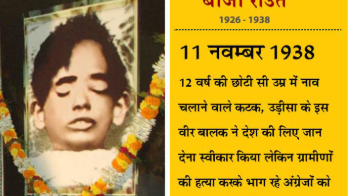

Bhubaneswar: Born in 1926 in the small village of Nilakanthapur in Odisha's Dhenkanal district, Baji's short life intersected with one of the most turbulent periods in India's fight against British colonial rule. What sets his story apart is not just his youth, but the extraordinary circumstances of his martyrdom on October 11, 1938—a date largely overlooked in mainstream historical narratives but preserved with reverence in Odisha.
While well-known freedom movements centered around figures like Gandhi and Nehru dominated the national stage, regional resistance movements were equally fierce. One such lesser-documented uprising was the Praja Mandal movement in the princely states of Odisha, where local populations fought against both British authority and oppressive local rulers.
"The Praja Mandal movements remain among the most under-researched aspects of India's independence struggle," notes Dr. Anil Kumar Dhir, a historian who has extensively documented Odisha's role in the freedom movement. "This context is crucial to understanding how a boy like Baji Rout became involved in such dangerous resistance activity."
What many don't realize is that the movement in Dhenkanal had reached a critical point in 1938 following the arrest of prominent leader Baishnav Charan Patnaik. Public anger had erupted into open rebellion, with the British sending forces to suppress the uprising and protect the interests of the local ruler who served as their proxy.
The obscure yet verified facts of Baji's final stand are both simple and profound. As a boatman on the Brahmani River, young Baji was part of the local Banar Sena (Monkey Army) of children who supported the freedom movement through small but significant acts of resistance.
On that October night, British soldiers, in pursuit of fleeing Praja Mandal activists, ordered Baji to ferry them across the river. Aware that doing so would endanger the lives of the freedom fighters hiding in nearby villages, the young boatman refused.
What makes this refusal remarkable is a little-known detail: Baji had been specifically instructed by local movement leaders to prevent any crossings that night. Despite being threatened at gunpoint, the illiterate boatman from an impoverished family understood the importance of his position as the river's gatekeeper.
"When the British soldiers ordered him to ferry them across, he shouted 'Mote maridelantu, mu sepahimalanku neba nahi' (You can kill me, but I won't ferry the soldiers)," recounts Pravat Muduli, curator of the Baji Rout Memorial Museum in Dhenkanal.
The enraged soldiers shot him, along with Laxman Malik, Fagu Sahoo, Hrushi Pradhan, and Nata Malik—local villagers who had come to the boy's aid. This group of martyrs, with Baji as its youngest member, is commemorated as the "Nilakanthapur Martyrs."
Perhaps the most interesting trivia surrounding Baji Rout is how his story might have faded entirely from national consciousness if not for the celebrated Odia poet Sachidananda Routray. His poem "Baji Rout" not only preserved the young martyr's memory but elevated it to literary immortality, with the haunting line: "The boatman of dark waters, now asleep."
This poem, included in school curricula throughout Odisha, ensures that generations of children learn about their young predecessor who defied an empire. The poem's impact was so significant that when the first memorial to Baji was constructed in 1947, inscriptions of Routray's verses were prominently featured.
A little-known fact about Baji's legacy is that his image appeared on a commemorative postage stamp issued by the Government of India in 2018, a full 80 years after his martyrdom. Despite this national recognition, many stamp collectors report being unaware of the history behind the solemn face of the young boy depicted.
The Baji Rout Memorial Boat Museum, established near the site of his martyrdom, houses the preserved remains of what is believed to be the actual boat he refused to row that fateful night—a tangible connection to a moment of extraordinary courage from an ordinary child.
As India celebrates its freedom fighters, the story of Baji Rout reminds us that courage knows no age, and that history's most powerful acts of resistance sometimes come from its youngest participants.